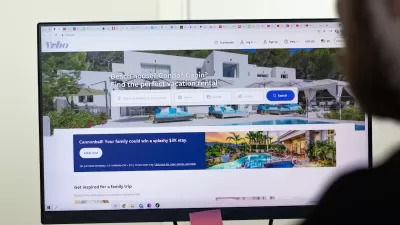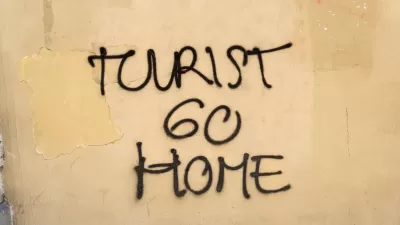Brendan O’Brien, author of “Homesick,” talks with us about his new book and what he's learned about the effects of short-term rentals in communities like Flagstaff, Arizona; Bozeman, Montana; and St. George, Utah.

Proponents of supply-side solutions to housing typically refer to high housing vacancy rates as a good thing. In theory, more vacant apartments mean more options for renters and competition between landlords for renters. But a look at vacancy rates across the country reveal a more confusing picture: The rate does not track closely with overall affordability.
There are a few reasons for this, but one of the most alarming is the trend of short-term rentals. Since they emerged in the mid-1990s and were supercharged in the 2010s, it’s become common for homeowners who have a little bit of extra money to buy a second home as an investment so they can make “passive” income. In some cases, single owners have sprouted mini-empires of entire apartments being rented out on these services. Units being rented out short-term are listed as vacant in census surveys, but they are not available to renters—at least, not for anyone but tourists.
These units pock the landscape of large, coastal cities and persist despite drawing down regulatory hammers. But in some towns, vacation homes and Airbnbs have been given free rein to transform the landscape more fully, crowding working people to the margins.
In his book Homesick, Brendan O’Brien looks at the intersecting issues of second homes, investment properties and short-term rental companies like Airbnb, VRBO and Homeaway. Specifically, he looks at Flagstaff, Arizona; Bozeman, Montana; and St. George, Utah, where these companies have been allowed to run rampant, hollowing out communities and fraying the social fabric. Arizona even passed a law in 2016 making it illegal to regulate short-term rentals at the local level (the restrictions were loosened somewhat in 2022). The following interview has been abridged and edited for clarity.
Airbnb says it’s just helping people with mortgages earn some extra income. What do you think about that argument?
Short-term rentals as they were originally marketed, [the idea] was, you have a spare bedroom, you can rent that out to people and make some extra money. It’s a better use of space when otherwise that room would just go empty. Someone coming into the community as a traveler can get a sense of the landscape because they know someone already. They’re staying with them.
The person who lives there can benefit more directly from tourism, and I still think that’s a great idea. But the way that short-term rentals have transformed over time—using the three [cities] that I studied Flagstaff, Arizona; St. George, Utah; Bozeman, Montana; as examples—it’s upwards of 90 percent of short-term rentals that are the entire home. Most of those are offered up for more than half a year. It’s not someone who’s just in an economically precarious situation, it’s someone who doesn’t live in a place seeing an investment opportunity and buying that up with the express purpose of housing tourists.
I see those very differently. And I think the first one should be protected. I think that’s a great source of income potential, and you can monitor over time [if] maybe that gets abused in some places. But I think that’s very different when you’re renting out a room and you actually actively live in a place versus renting an entire place.
FULL STORY: Running Rampant: How Short-Term Rentals Impact Communities With Loose Restrictions

Alabama: Trump Terminates Settlements for Black Communities Harmed By Raw Sewage
Trump deemed the landmark civil rights agreement “illegal DEI and environmental justice policy.”

Study: Maui’s Plan to Convert Vacation Rentals to Long-Term Housing Could Cause Nearly $1 Billion Economic Loss
The plan would reduce visitor accommodation by 25% resulting in 1,900 jobs lost.

Planetizen Federal Action Tracker
A weekly monitor of how Trump’s orders and actions are impacting planners and planning in America.

Wind Energy on the Rise Despite Federal Policy Reversal
The Trump administration is revoking federal support for renewable energy, but demand for new projects continues unabated.

Passengers Flock to Caltrain After Electrification
The new electric trains are running faster and more reliably, leading to strong ridership growth on the Bay Area rail system.

Texas Churches Rally Behind ‘Yes in God’s Back Yard’ Legislation
Religious leaders want the state to reduce zoning regulations to streamline leasing church-owned land to housing developers.
Urban Design for Planners 1: Software Tools
This six-course series explores essential urban design concepts using open source software and equips planners with the tools they need to participate fully in the urban design process.
Planning for Universal Design
Learn the tools for implementing Universal Design in planning regulations.
Caltrans
Smith Gee Studio
Institute for Housing and Urban Development Studies (IHS)
City of Grandview
Harvard GSD Executive Education
Toledo-Lucas County Plan Commissions
Salt Lake City
NYU Wagner Graduate School of Public Service




























